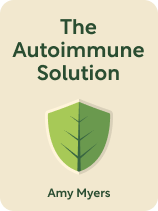

This article is an excerpt from the Shortform book guide to "The Autoimmune Solution" by Amy Myers. Shortform has the world's best summaries and analyses of books you should be reading.
Like this article? Sign up for a free trial here.
What is The Myers Way? Is it possible to reverse autoimmune disease? What lifestyle changes does Myers suggest?
In The Autoimmune Solution, Amy Myers shares her method for preventing or reversing autoimmune disease, which she calls The Myers Way. The method includes several lifestyle changes and strategies for improving your immune system.
Below, we’ll discuss Myers’ method in detail.
Myers’ Method to Prevent or Reverse Autoimmune Disease
Amy Myers offers a method to prevent or reverse autoimmunity, which she refers to as The Myers Way. Her method has four prongs: improving gut health, eliminating inflammatory foods, reducing your exposure to toxins, and addressing hidden infections while managing stress. In addition, she advocates for several health-promoting strategies with a 30-day meal plan as the central element. Since these themes and strategies often overlap, we’ve reorganized Myers’ insights into one overarching goal, two guiding strategies, and lifestyle changes to support them.
(Shortform note: While research supports many of Myers’ claims about the stressors that can lead to autoimmunity, her method for addressing them is still unproven. Part of the difficulty is that it involves many factors, such as implementing a restrictive diet, managing your stress, and managing your toxin exposure. This makes it hard to identify which factors—if any—are impacting your health. In addition, some readers are apprehensive about the restrictiveness of the 30-day meal plan and the cost of using the supplements Myers recommends.)
Myers’ Goal: Support Your Immune System
According to Myers, supporting your immune system, rather than suppressing it, is central to preventing and reversing autoimmunity. Her method focuses on strengthening and balancing your immune system through diet, detoxification, and lifestyle changes. She argues that her method reduces the stress on your immune system, which in turn reduces autoimmune symptoms.
Myers’ method has two guiding strategies to achieve better health: restoring your body’s healthy digestion and avoiding unnecessary stress on your immune system. These strategies help you achieve the goal of supporting your immune system so it retains or regains balance. Below, we’ll explore each strategy and the lifestyle changes to implement them.
(Shortform note: While supporting the immune system is important for health, there are instances where suppressing the immune system is medically necessary to prevent immediate, life-threatening damage. For example, the immune system can aggressively attack the body, such as in severe autoimmune conditions or after organ transplants. In these cases, immunosuppressant drugs are used to prevent the body from attacking healthy cells and tissues or rejecting a transplanted organ.)
Strategy 1: Restore Your Body’s Healthy Digestion
Myers argues that because your digestive and immune systems overlap, healthy digestion helps balance your body’s immunity responses. In addition, a healthy digestive system helps your body absorb the nutrients from the food you’re eating, which supports your overall health. Below, we’ll explore the lifestyle changes she offers to help you restore your body’s healthy digestion.
Change 1: Implement a Strict 30-Day Diet
To restore healthy digestion, Myers recommends a strict 30-day diet where you don’t eat any toxic or inflammatory foods.
As we’ve discussed, toxic and inflammatory foods disrupt your digestive system, triggering or exacerbating autoimmune conditions. Eliminating these problematic foods and replacing them with nutrient-dense, healing foods will reduce inflammation, support digestive healing, and restore proper immune function—all crucial aspects of reversing autoimmune dysfunction.
Myers shares several toxic and inflammatory foods to avoid during the 30-day diet: corn products, dairy, gluten, grains, and soy. Myers also suggests eliminating some foods commonly thought to be healthy which are actually inflammatory, including legumes, nightshade vegetables, nuts, and seeds. She argues that these foods trigger inflammation because they have compounds that irritate the gut, similar to gluten.
The healthy foods to focus on eating are high-quality proteins, organic vegetables and fruits, and healthy fats.
- High-quality protein sources include grass-fed meats, wild-caught fish, and organic poultry.
- Healthy, organic fruits and vegetables include leafy greens, cruciferous vegetables, squash varieties, berries, citrus, melons, and tree fruits.
- Sources of healthy fats include avocado, coconut oil, and olive oil.
After the initial 30 days, you can reintroduce some of the inflammatory foods you eliminated in small amounts. However, Myers argues you should never eat gluten and dairy because they cause major inflammation, even in very small amounts. In addition, the health-promoting foods she recommends eating should be the bulk of what you eat daily.
Finally, Myers advises avoiding all non-essential medications during the 30-day diet because they can interfere with liver detoxification. However, you should never stop taking essential medications without consulting a healthcare provider.
Change 2: Use Supplements
While a healthy diet is fundamental, Myers believes it’s not enough to ensure proper nutrition. Therefore, supplements are necessary for everyone. This is because the modern food system compromises food quality with industrial farming, pesticides, and GMOs. She explains that toxins are so ubiquitous that even foods marketed as healthy or natural are likely to contain some health-disrupting chemicals. In addition, leaky gut, environmental toxins, common infections, and high levels of stress hamper your body’s ability to absorb the nutrients it needs.
The specific supplements needed vary by individual, but Myers suggests some that can benefit everyone:
- Probiotics and L-glutamine to heal your gut lining
- Omega-3 to reduce inflammation
- Vitamin D to heal hidden infections
- Glutathione and vitamin C to support natural detoxification processes
Strategy 2: Avoid Unnecessary Stress on Your Immune System
Reducing your exposure to stressors like toxins or illnesses reduces the chances that acute inflammation will become chronic. Myers argues this will help moderate your body’s immune responses and prevent or reverse autoimmunity. Below, we’ll explore five lifestyle changes she suggests to help you avoid stressing your immune system.
1) Work with your doctor to identify and treat hidden viral or bacterial infections. (Shortform note: If you suspect you have an infection that hasn’t fully healed because the symptoms keep coming back, ask for a referral to an infectious disease doctor. These specialists are like medical detectives who focus on infections that may require expert diagnosis and treatment, such as chronic infections.)
2) Get enough sleep: Aim for seven and a half to nine hours of sleep every night. (Shortform note: If this goal feels challenging, you’re not alone. The Centers for Disease Control and Prevention (CDC) recommends that adults sleep at least seven hours a day—but the percentage of adults sleeping significantly less than this is so high that the CDC has declared it a public health epidemic.)
3) Exercise, but don’t overexert yourself: If you’re already on the autoimmune spectrum, Myers believes exercise can be beneficial up to a point. Since your body needs energy to heal, she argues this isn’t the time to exercise too intensely or frequently. (Shortform note: In Exercised, Daniel Lieberman explains that even small amounts of exercise provide significant benefits. So, if you can’t follow the usual recommendation of 150 minutes of exercise per week, it’s still better to do a little exercise than none at all.)
4) Manage your stress: Deal with stressors immediately without dwelling on them, and incorporate stress-relieving activities into your routine. (Shortform note: Use the “5 A’s” method to manage your stress. Avoid unnecessary stressors, alter the situations you can influence, adapt to and accept what you can’t change, and be active to relieve stress.)
5) Avoid indoor toxins: Install HEPA air filters at home and work, and use water filters on all taps. Myers also recommends gradually replacing personal care products with toxin-free alternatives and eliminating any mold in your home.

———End of Preview———
Like what you just read? Read the rest of the world's best book summary and analysis of Amy Myers's "The Autoimmune Solution" at Shortform.
Here's what you'll find in our full The Autoimmune Solution summary:
- How to prevent or even reverse autoimmune diseases with lifestyle changes
- A comparison of traditional vs. functional medicine approaches to autoimmune diseases
- The Myers' Method for strengthening and balancing your immune system






